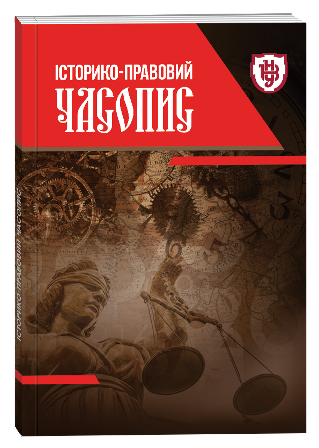Resistance to Oppression – the Right of Force or the Right of Law?
Keywords:
right for resistance to oppression, revolution, rebellion, tyrannyAbstract
The article considers the historical roots of resistance to oppression, the dual nature of this phenomenon as the right of force or the right of law. In the focus of attention are the doctrinal conceptions of the phenomenon under consideration, history of fixing it in the positive law as the right for resistance (jus resistendi), recognition of this law as international norm, pluralism of approaches to its constitutional recognition. Despite the right for resistance received international legal recognition and the number of constitutions in the world in which it is stipulated has crossed 20 percent threshold, nearly every issue of this right is controversial. Most democratic states are in no hurry to issue legally the right for resistance to oppression and moreover to overthrow the existing regime. Much attention is paid to the peculiarities of jus resistendi which is inherent, particularly to its subject, and is characterized by multiple goals, as well as methods of implementing this right, which can not be fixed in positive law. The author concentrates on the issues characterizing the peculiar perception of this phenomenon in the Eastern tradition. Much attention is paid to non-violent forms of realization of this right, and such extreme manifestation of it as revolution, the impact of communication technologies on counteraction to the authorities.
References
Гольдфарб А. Легитимность мятежа [Электронный ресурс] / А. Гольдфарб // Грани.Ру. – 2012. – 12 июня. – Режим доступу: http://grani.ru/blogs/free/entries/198337.html; Гузар І. Л. Право на повстання – то є закон природи [Електронний ресурс] / І. Л. Гузар // Україна молода. – 2014. – № 003. – 10 січня. – Режим доступу: http://www.umoloda.kiev.ua/number/2395/180/85201; Рогов К. Монополия на насилие и право на восстание [Электронный ресурс] / К. Рогов // Новая газета. – 2014. – № 8. – 27 января. – Режим доступу: http://www.novayagazeta.ru/columns/61949.html; Юров А. Восстание – право или обязанность? [Электронный ресурс] / А. Юров // Украинская правда. – 2014. – 17 февраля. – Режим доступу: http://www.pravda.com.ua/rus/columns/2014/02/17/7014094/?attempt=1.
Кант И. Общее замечание относительно правовых следствий из природы гражданского союза / И. Кант // Метафизика нравов в двух частях. 1797. Соч. в 6 Т. – Т. 4. – Ч. 2. / под общей ред. В. Ф. Асмуса, А. Я. Гулыги, Т. И. Ойзермана; ред. тома В. Ф. Асмус. – М.: Мысль, 1965. – 544 c.
Торо Г. Д. О гражданском неповиновении / Генри Дэвид Торо // Новые пророки. Торо. Толстой. Ганди. Эмерсон / пер. с англ. О. В. Альбедиля. – СПб.: Алетейя, 1996. – 352 с.
Дюги Л. Конституционное право. Общая теория государства : пер. с фр. / Л. Дюги ; пер.: В. Краснокутский, Б. Сыромятников, А. Ященко ; предисл.: Л. Дюги, П. Новгородцев. – М.: Изд. Т-ва И. Д. Сытина, 1908. – 957 c. 5. Маркс К. К критике политической экономии / К. Маркс // Маркс К., Энгельс Ф. Сочинения : в 50 т. – Т. 13. – [2-е изд.]. – М.: Госполитиздат, 1959. – 771 c.
Хантингтон С. Политический порядок в меняющихся обществах / С. Хантингтон. – М.: Прогресс-Традиция, 2004. – 480 c.
Погребняк С. П. Сопротивление угнетению. Восстание. Революция (теоретико-правовой анализ в свете доктрины прав человека) / С. П. Погребняк, Е. А. Уварова // Право і громадянське суспільство. – 2013. – № 2. – С. 4-61.
Лейн Д. «Кольорова» революція як політичний феномен / Д. Лейн // Соціологія: теорія, методи, маркетинг. – 2010. – №. 1. – С. 16-38.
Ганди М. Мой Толстой / М. Ганди // Новые пророки. Торо. Толстой. Ганди. Эмерсон / Пер. с англ. О. В. Альбедиля. – СПб.: Алетейя, 1996. – 352 с.
Downloads
Published
How to Cite
Issue
Section
License

This work is licensed under a Creative Commons Attribution-NonCommercial 4.0 International License.







